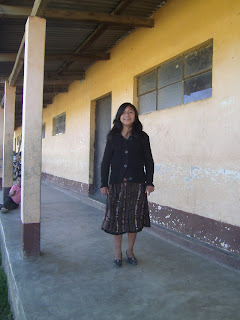Blessed are those who help those with Special Needs
Most of us are used to the many handicap specifications that
are built into our society. There are
elevators in the airports next to the escalators and wide stall doors in the
bathrooms as well as ramps for easy wheelchair access all over. Our society, by law, demands that we make
accommodations for many different kinds of special needs.
But we found out when Vicki broke her ankle down here in
Guatemala that our sentiment toward the disadvantaged is not universal. Neither one of us will forget the ride home
on the airline. After being promised the
utmost courtesy over the phone, she was rudely treated by the Latin airline
staff. When she complained they
threatened to kick her off the flight.
She had to keep her leg elevated on top of my knee for the four hour
flight. When we arrived at Dulles, an
American announced to the entire shuttle that Vicki was to disembark
first. But as soon as he left and the
door opened, we were pushed back in our seats by Guatemalan throng and forced
to wait to the very last for our own safety.
Vicki absolutely refuses to fly Taca again.
There is no safety net for the poor here. While there is a National hospital system
that does help without cost, it is not free because of the many other services
that are often beyond the pale for most of the indigent in Guatemala. You must bring your own food to the hospital,
medicines and auxiliary procedures are not necessarily free and you must have a
family member be the nurse because that service is not included. Neither is transportation or the cost of an
overnight stay if you are not being treated in-hospital.
With this knowledge and a heart for the many special needs
kids that come to our programs, we try to help get medical treatments for the
poor that we often take for granted in the States. For you that support a medically fragile
child here, know that sometimes you are literally a lifesaver but always a good
Samaritan.
On Vicki’s first visit to the Momma’s and Tot’s program this
year she had a ready line of those asking for help. First was Eli (his name is way too long to
write). He was two months old and his
head was the size of a basketball—hydrocephalus. The mother was young, poor, with one other
child and no husband. She had been to
the National hospital once already and they had drained the fluid from his
head. The incision was visible. Since the fluid returned he was going to
need a shunt but she didn’t have the money for a return visit nor the series of
visits it would take to treat this condition.
Vicki gave her Q100 for travel as well as two cans of formula because
she had no milk of her own and obviously could not afford formula on her
own. She lives in a village next to
Godinez.
Next was Flavio, the 5 year old, blind Downs boy that Peter,
our Boston pediatrician, has seen several times. Peter recommended a professional examine and
the child has diagnosed with cataracts.
Again his family is VERY poor.
(Dominga checks these things out for us.) The next step for him before he can be
considered for surgery is an appointment to get an echo-cardiogram since Downs kids often have weak hearts. That procedure is Q275.
Eduardo was next. His
parents have been regulars at our programs for years. He needs a hearing aid that we hope Peter can
come up with. Meanwhile, we have a faithful donor
paying for his transportation one day a week to go to a special school for the
deaf in nearby Panajachel. His mother
would like for him to go every day and is willing to do the leg work if we can
find a sponsor to pay for the other days. Sorry his picture was in the shadows as he has the sweetest, most humble eyes of any child I can think of.
This was just an average day in a land with abundant
need. If you’d like to help any of these
situations or any of the numerous others that are going to pop up, let us know.
I, Vicki, gave the money for the preliminary needs knowing I could trust you to make the donations to replace it and also knowing I did not have the words to turn them down.
thanks for the help
Vicki
I, Vicki, gave the money for the preliminary needs knowing I could trust you to make the donations to replace it and also knowing I did not have the words to turn them down.
thanks for the help
Vicki






